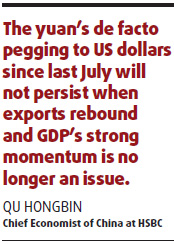Repeat bull stock market not likely now
Updated: 2010-01-23 07:25
By Li Tao(HK Edition)
|
|||||||
Modest appreciation of yuan, less infrastructure investment seen
HONG KONG: After last year's significant bull run, swings and corrections are expected to be the themes of the Hong Kong stock market in 2010, according to HSBC.
At the HSBC Asian Outlook 2010 press briefing held on Friday, Garry Evans, Global Head of Equity Strategy from HSBC said the second year of a bull market has rarely been as easy as the first, even when equity fundamentals remain positive.
"Bull markets don't usually end that quickly, but returns in the second year are rarely as good. Based on historic experience, I predict the Hong Kong stock market to experience a 15 to 20 percent correction in 2010, which has already emerged in the Hang Seng Index recently," said Evans.

Evans said incomplete statistics suggested the Hang Seng Index recently experienced a 15 percent accumulative slump compared to the peak ended December 31, 2009, but he believes the correction will provide good buying opportunities for investors when stocks are cheap again. As A-shares are more expensive, H-shares by comparison will stay attractive over the short term.
On China, HSBC said the mainland's recovery will be sustained in 2010, although overheating risks will accompany the economy's further warming-up, particularly when exports are eventually back on track again.
"The second-round effect of stimulus measures is filtering through, where domestic demand alone can support a 9.5 percent GDP growth in 2010. An upside surprise in exports, however, would lead to bigger overheating risk," said Qu Hongbin, chief economist of China at HSBC.
Qu said the central government's policy had stressed the need to further stimulate consumption while strictly controlling new construction projects. Finance Minister Xie Xuren also hinted earlier the growth in the government's investment spending would drop to 7 percent year-on-year from last year's 120 percent.
Qu believes the pace of infrastructure projects will slow sharply, while the government will divert money from construction to spending on education and healthcare this year.
"Monetary tightening is needed to cool the boom this year, as the real estate growth in certain areas had suggested certain bubbles. Real growth in urban fixed asset investment in 2010 is likely to drop from over 33 percent last year to 23 percent," Qu said.
"Consumer credit, on the other hand, is likely to expand rapidly as cars and other durable goods consumption will probably continue to thrive in the coming years," Qu added.
Qu said although export growth this year is unlikely to return to previous paces, its continuous rise has still been faster than most expectations, which would leave opportunities for the yuan to strengthen as the economic environment further improves.
"The plan to expand the yuan's role in trade settlement implies a policy preference for gradual appreciation. The yuan's de facto pegging to US dollars since last July will not persist when exports rebound and GDP's strong momentum is no longer an issue."
However, Qu predicts the pace of the yuan's appreciation will in all likelihood be much slower than in previous years - about 3 to 4 percent increases on a yearly basis.
Qu thinks the Central Bank is likely to raise interest rates twice this year, each time by 27 basis points, in order to prevent an asset bubble and slow economic over-heating.
(HK Edition 01/23/2010 page2)